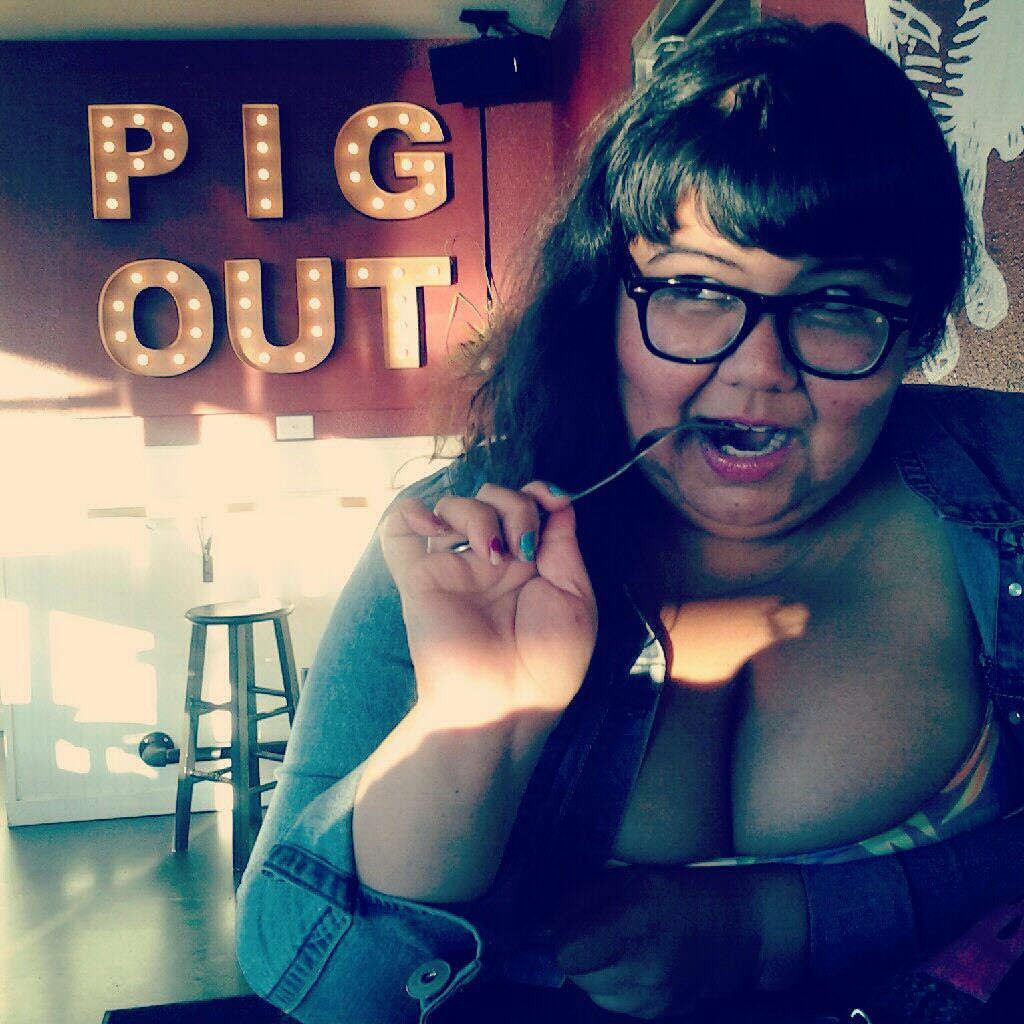In a society captivated with dieting and waist size, one SF State alumna fights back.
Virgie Tovar is a self-declared fat activist, body image expert, sexologist and author whose promotion of fat acceptance and self-love has received significant attention from the mainstream media.
“My goal is to eradicate diet culture because I’m done watching people give their lives away one bite at a time,” Tovar said. “Many people realize too late that no amount of weight loss or body-alterations actually free us from that ‘I’m never good enough’ mentality.”
Tovar is one of the many speakers participating at Love Your Body Week, which begins at SF State Feb. 13. The two part event about positive body image is hosted by Active Minds, a student group raising awareness about mental health.
As an alumna of SF State, Tovar comprehends the pressures college students face. She identifies with the stressors in college that include performing in academics, preserving relationships and managing a budget.
“On top of that you’re also dealing with the cultural obsession with weight loss and the ‘perfect’ body,” Tovar said. “This message is targeted at people who are in the age group of most students at State.”
The National Eating Disorder Association reports that 10 to 20 percent of women and 4 to 10 percent of men in college in the United States suffer from an eating disorder.
Twenty-four million people in the United States suffer from an eating disorder, but only 1 in 10 people receive treatment, according to the National Association on Anorexia Nervosa and Associated Disorders website.
Tovar was not always as confident and outspoken on the issues she now proudly promotes. Like many young women, Tovar said she has struggled with body image and said she believed her life would not start until she became thin.
“I would wear a bikini later,” Tovar. “I would be happy later. I would fall in love, wear cute clothes, feel beautiful, wear red lipstick, travel, enjoy cake, smile in pictures later. I would love myself later. I lived a very long time with the belief that my body was my enemy and my greatest failure.”
In 2007, Tovar wrote her first essay about her body titled “Fatties of the World Unite.” When she published it online she said it resonated with readers.

She reached a turning point in 2010, when she was first introduced to the fat acceptance movement through her graduate studies at SF State.
“I felt like I had entered this secret society of amazingly bold and hot fat babes who were revolutionizing the world,” Tovar said. “I grew up being taught that my life as a fat girl was going to be pretty limited.”
Love Your Body Part I was developed by health educator Ingrid Ochoa. The event focuses on sexual health while Part II, created by clinical counselor Yolanda Gamboa, centers on eating disorders and body acceptance.
The first part of the event includes tabling by Peer Educators Advocating Campus Health. Mikaela Amble and Dailly Mack, members of PEACH in their second year with the program, said they would try to make the event open and welcoming for students.
“We want people to be able to relate to it,” Amble said. “Some people aren’t really sure what their gender qualifies as or where they belong so we try to make it so they find at least one thing they can relate to when they talk to us or come play games with us.”
Part II begins Feb. 23 and coincides with National Eating Disorder Awareness Week. The nationwide week-long event will center around the theme of “I Had No Idea,” which will focus on the significance of early intervention and the unique experiences of each individual, according to the National Eating Disorder Information Center’s website.
Scheduled activities for Love Your Body include tabling and four workshops including ‘Let’s Talk: About Beyonce and Body Image,’ ‘Body Positive Workshop’ and the highly regarded ‘Alter Ken and Barbie on the Plaza.’
“We have students use clay to mold Barbie to look more like themselves because Barbie and Ken are one image, but we want the Barbie’s to represent the diversity of the campus,” Gamboa said.
Love Your Body Part II will wrap up with Virgie Tovar’s workshop on Feb. 26. Tovar described the event as “an amazing tour-de-force” that will feature student discussions, writing activities and readings from her book “Hot & Heavy: Fierce Fat Girls on Life, Love & Fashion.”
“It’s going to be deep, fun, potentially awkward, but ultimately super provocative and educational,” Tovar said. “I want students to begin to really critically analyze diet culture and the way that it touches their lives. I want students to leave empowered to tell their own stories.”








DorothyBuggs • Jul 15, 2015 at 3:49 am
Found the fatty
Hezerminator • Jul 15, 2015 at 3:25 am
“I want students to begin to really critically analyze diet culture and the way that it touches their lives.”
I expect that this ‘critical’ analyze doesn’t touch the McBeetus chain and the other FastFood restaurants. It’s also safe to expect that the subject of eating nauseating amounts of candy and cupcakes is not touched.
This is pure delusion. The whole article reeks of severe addiction. Virgie has a huge mental health problem but somehow she has managed to turn it into a positive asset? Just ten to twenty years ago this article would have been just a bad satire.
Sam Carmine • Feb 12, 2015 at 8:25 am
These types of events give fat people an excuse to stay fat, ignoring that the health consequences are inevitable. No one is saying you need to look like Barbie, but if you’re carrying around an extra 50 or 100+ lbs, you are going to suffer health related issues eventually.
Diabetes, worn out knee joints (pain), heart attack, etc.
This is simply reality.
Carrying an extra 20lbs and don’t really have curves? Not really big deal. You’re so large that you need two seats on the train? Big deal.
For those saying “why don’t you just fuck off and leave other people alone?” Here is my response:
1. Obesity costs me money – from the scooters at Walmart to airlines giving away a free seat or trains carrying less passengers because of bigger seats, these costs are passed on to me as a consumer.
2. Obesity costs society. That great doctor that would have discovered the cure for cancer if he hadn’t died of a massive coronary last year? Well, we just missed out.
3. Obesity is disgusting to look at. When you see a person covered in lice and weeping pus-filled sores, you are naturally disgusted. Right or wrong, your hind brain is telling you to stay away from that person to avoid being infected by his unhealth. This disgust is generalized to all types of people tha look unhealthy, such as fat people. This is a natural reaction.
Jamie • Feb 12, 2015 at 1:02 pm
Body acceptance doesn’t necessarily entail body neglect. Overweight people understand the health implications of their weight (it’s constantly shoved down their throat), and many ARE trying to become healthy: physically, mentally, and emotionally. If we keep telling people to hate themselves for being fat, that is likely to contribute to the underlying feelings that may have caused the obesity in the first place. One of the first steps towards becoming a healthy person is self-love, and a part of that is showing love to your self and your body no matter what shape it’s in. We can’t hate ourselves until we become some physical ideal, because once we become society’s definition of “ideal,” who’s to say we’ll even feel good about ourselves even then? There may very much still be weight in our psyche and in our self-esteem. Health starts in the mind.
Sam Carmine • Feb 12, 2015 at 2:55 pm
I agree that body acceptance doesn’t necessarily entail body neglect, and I don’t actually have a solution – for which I apologize.
What I am certain of, is though acceptance and self love may help some people become healthy, more people will use it as a crutch. Hey, when I see someone overweight at the gym, I’m happy to give them a nod. Good on you, keep it up.
Actually, scratch what I said. I do have a solution. Take the emotion out of the picture. Stop loving your body or hating it, and instead view it as a vessel that carries your soul and personality and allows you to interact with the world. Focus on the technical and push the emotion out of your mind. Count your calories and when you’ve exceeded 1900 in a day, stop eating. Drink lots of water. Be steady so that your vessel of a body can continue to carry on as long as possible.